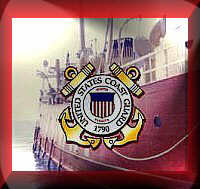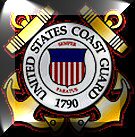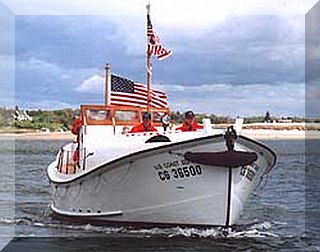|
A legendary
rescue
Fifty years ago, 32 seamen
aboard a stricken ship were saved from a vicious storm by four Coast
Guardsmen.
By
JOHN LEANING
STAFF WRITER
CHATHAM - There's an old Coast Guard saying, "You have to go out, but
you don't have to come back."
Boatswain's Mate 1st Class Bernard Webber knew the
saying, but wasn't quite sure it really meant what it seemed to say.
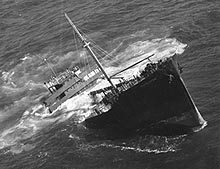
 The bow of the tanker Pendleton floats six
miles off Chatham after breaking in half in towering seas on Feb.
18, 1952.
The bow of the tanker Pendleton floats six
miles off Chatham after breaking in half in towering seas on Feb.
18, 1952.
(Photos from the collection
of William P. Quinn)
|
Fifty years ago tomorrow, Webber, now retired and living in
Melbourne, Fla., was in charge of the 36-foot wooden lifeboat with three
on board from Coast Guard Station Chatham that saved the lives of 32
seamen on the stricken tanker Pendleton, which split in two during a
fierce northeaster six miles off Chatham.
Eight others trapped on the Pendleton's bow perished. Their bodies
were never recovered.
After surviving those seas and saving the lives of almost all the
Pendleton's men, Webber, then 24, said he understood that old saying
better than most.
"I never was really sure about that saying. But the night of the
Pendleton, I found out that was true," he said.
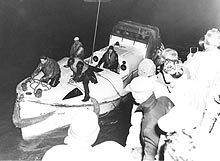
 The Coast Guard rescue boat CG36500 returns to
the Chatham Fish Pier with 32 survivors of the wreck of the
Pendleton.
The Coast Guard rescue boat CG36500 returns to
the Chatham Fish Pier with 32 survivors of the wreck of the
Pendleton.
|
The rescue, in pitch-black darkness, with hurricane-force winds
driving stinging snow and sleet and monstrous waves 60-feet tall, has
been heralded as the most difficult rescue attempted by a small boat
station in the 212-year history of the Coast Guard.
"I believe the Pendleton rescue is clearly the pre-eminent rescue by
a small boat crew in the entire history of the Coast Guard," said Capt.
Russell Webster, former commander of Coast Guard Group Woods Hole, now
chief of operations for Coast Guard First District in Boston.
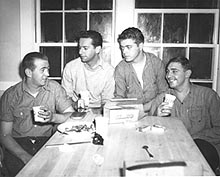
 The crew of Coast Guard rescue boat CG36500
relax after rescuing 32 crewmen from the Pendleton. From left are
Bernie Webber, Andrew Fitzgerald, Richard Livesey and Irving Maske.
The crew of Coast Guard rescue boat CG36500
relax after rescuing 32 crewmen from the Pendleton. From left are
Bernie Webber, Andrew Fitzgerald, Richard Livesey and Irving Maske.
|
"There are very few in the same class in terms of degree of
difficulty," he said.
That opinion is shared by local watermen who know firsthand the
treacherous bars and dangers of the open ocean off Chatham.
"The conditions they endured are phenomenal. I read about it, and I
kind of shake my head," said Chatham Harbor Master Stuart Smith, himself
the recipient of honors from the Coast Guard for rescues at sea he has
performed.
"What I have accomplished in rescues doesn't come anywhere near what
they endured. Those conditions were like what we had in the Perfect
Storm.
"In those conditions, to go out and come back," Smith paused,
laughing, "I laugh because I'm not sure how you can accomplish that,
even today.
"If anyone pulled off the impossible, they did. It's unbelievable
they brought them all back," Smith said.
|
|
Marking a
milestone
The Pendleton rescuers, at least one Pendleton
crew member, and the USCG36500 lifeboat will be honored in private
and public ceremonies Marking a milestone during Maritime History
Week May 11-18.
 In Chatham, Bernard Webber, coxswain of
the motor lifeboat that carried 32 crew members of the Pendleton to
safety, and surviving members of his crew will be honored in a
private ceremony May 15. They will ride in the restored 36500, now a
floating museum based in Orleans, and owned by the Orleans
Historical Society, and be luncheon guests at Coast Guard Station
Chatham. In Chatham, Bernard Webber, coxswain of
the motor lifeboat that carried 32 crew members of the Pendleton to
safety, and surviving members of his crew will be honored in a
private ceremony May 15. They will ride in the restored 36500, now a
floating museum based in Orleans, and owned by the Orleans
Historical Society, and be luncheon guests at Coast Guard Station
Chatham.
 From 3-5 p.m. May 15, there will be an
open house at the Orleans Historical Society meeting house on School
Street in Orleans, next to the town hall. From 3-5 p.m. May 15, there will be an
open house at the Orleans Historical Society meeting house on School
Street in Orleans, next to the town hall.
 On May 18, from 1-4 p.m., special events
will be held at Rock Harbor in Orleans. They will include tours of
the CG36500, as well as tours of the Coast Guard's newest rescue
boat, the 47-foot motor lifeboat. There will also be a demonstration
of the old breech's buoy rescue apparatus. On May 18, from 1-4 p.m., special events
will be held at Rock Harbor in Orleans. They will include tours of
the CG36500, as well as tours of the Coast Guard's newest rescue
boat, the 47-foot motor lifeboat. There will also be a demonstration
of the old breech's buoy rescue apparatus.
|
|
All four members of the Pendleton rescue crew were awarded the Coast
Guard's Congressional Gold Lifesaving Medal, equivalent to the
military's top medal for bravery, the Congressional Medal of Honor.
Coincidentally, a second tanker, the Fort Mercer, identical in design
to the Pendleton, was crippled by the same storm on the same day, and
also broke in two, stranding 43 men on the two sections. Since the Fort
Mercer was farther out to sea, larger Coast Guard cutters responded to
that ship, saving 38 from the stern section. Five other crew members
were trapped on the bow. The bodies of those five were never recovered.
Coast Guard Chief Boatswain's Mate Donald Bangs, now living in
Sandwich, attempted to reach the Fort Mercer with the CG36383 out of
Stage Harbor in Chatham, but was diverted to the bow section of the
Pendleton to rescue a crew member.
That individual jumped toward the CG36383 as rescuers arrived, but he
fell into the sea, and his body was never recovered.
Counting the "Gold Medal" crew that rescued 32 from the Pendleton,
different units involved in the Fort Mercer rescue were also honored for
bravery.
In all, five gold life-saving medals, four silver life-saving medals,
and 15 commendation medals were awarded for a total of 24 citations for
the two rescues.
Both rescue crews from Chatham relied on the small boat station
workhorse, the 36-foot motor lifeboat, powered by a 90-horsepower
gasoline engine.
Webber, with crewmen Richard P. Livesey, Irving Maske and Andrew
Fitzgerald assisting, somehow managed to bring back 32 of 33 crewmen
marooned on the drifting stern of the Pendleton.
Webber's memories of that dramatic rescue are as strong as the wind
and waves that pounded his lifeboat that night.
He remembers doing it. But to this day, he doesn't know how.
'Running into a stone wall'
The rescue began around 3 p.m. on Feb. 18, 1952.
That's when the Chatham station's radar picked up two contacts - the
Pendleton's bow and stern sections - about six miles east of Chatham.
After it became apparent the two sections were drifting south and were
not going to come ashore, the Chatham Station prepared to mount an
at-sea rescue effort.
Shortly after 6 p.m. Webber and his crew left the Chatham Fish Pier
heading for the open ocean over the notorious Chatham Bars.
"I remember singing 'Rock of Ages,' going by the station. And I
remember seeing the dim glow of the lighthouse, and thinking about all
those suckers having a cup of coffee, and wishing we were there.
"I still have that feeling to this day," Webber said quietly.
Then he chuckled and recalled that he radioed the Chatham station
three times on the way out to make sure they still wanted him to go out
into the teeth of the gale.
"Proceed as directed" the station radioed back.
Going over the bar, a mass of waves stood like a menacing, moving
mountain.
"The first wave was like running into a stone wall. It crashed down,
spun us around and sent us back into the harbor. Then I turned us around
and tried it again," he said.
The storm then smashed the CG36500 with a breaking wave that drove
solid green water over the little boat.
The impact shattered glass in the windshield, and wrenched the
compass off its mount.
Orleans resident and shipwreck author William Quinn, Webber's friend,
said Webber still has tiny glass fragments in his face from the
exploding windshield.
Once past the bar, Webber remembered that while the seas became
taller, it was "at least manageable" since they were farther apart.
Winds were gusting 60 and 70 mph or more in the pitch black. Snow and
sleet pelted the Coast Guard crew as they headed out in search of a ship
they couldn't see.
"The only thing I had in my mind is that it was like being in a black
hole," Webber recalled last week in an interview.
'Something was out there'
He turned the boat into the seas, heading east, hoping to catch a
glimpse of the Pollock Rip lightship, so he could get his bearings.
"Some of the waves were breaking over us, some weren't. It was like
climbing up a hill, when you can't see the top," Webber said.
"About the time you think the old 90 hp was going to crap out and
throw you backward, suddenly you were on top of the wave.
"Then you were sliding down, and I had to put the engine in reverse,"
he said, explaining that the lifeboat was traveling so fast down the
backside of the wave, it would have buried its bow in the bottom trough
and flipped end over end if he hadn't slowed down the descent.
He never saw the lightship, and he has no idea how long he headed
east into the darkness and the huge waves.
"Time is a funny thing. I was working for the Lord," Webber said.
"Then a strange feeling came over me. I couldn't see anything, but
all of a sudden, I heard a rumbling and crashing, and I knew something
was out there."
He slowed down, told a crew member to shine a spotlight ahead, and "I
was looking right where it split.
"There was a mass of frothing white water and twisted steel, rearing
up and down in the seas," he recalled.
At first, they saw no lights, but as they rounded the stern, they saw
the dim glow of deck lights, and one man at the rail, waving his arms.
"For cripes sake, all this way for one man?" Webber thought to
himself.
But then someone threw a Jacob's ladder - rope sides with wooden
steps - over the side, and the crew started scrambling down.
Some timed the jump from the ladder to the pitching boat correctly,
landing on the slippery deck where Coast Guard crewmen snagged them and
brought them to safety in the covered forward cockpit or stern engine
compartment.
Others missed the boat and fell into the sea.
The Coast Guard crew managed to grab those in the water, somehow
lifting them up and to safety.
"One of my guys would grab a hand, just in time, and then they'd
fling them on board like a tuna. They were miracle workers," he said.
Except for one man.
Pendleton crewman George "Tiny" Myers, a 300-pound seaman who helped
others to safety, fell into the sea from the ladder as Webber was
maneuvering the lifeboat into position.
It was in the stern, and Webber had to deal with the heavy seas, and
the Pendleton's three 11-foot propeller blades as he brought the boat in
close.
"I had sight of him. I eased the boat in. There was almost no head
room. Suddenly, a sea came up from behind, throwing the boat forward,"
he remembered.
Desperate, Webber jammed the motor into reverse and gave it full
throttle.
The lifeboat didn't stop, and Myers was trapped between the tanker's
hull and the lifeboat.
"It hit him. He exploded like a bomb. He was gone, and I was gone. It
took the wind out of me, I tell you that," Webber said softly.
'Just ordinary guys'
On the way back to Chatham, still without a radio and any way to tell
direction or location, Webber put the waves astern, knowing at worst the
CG36500 would beach on Cape Cod or Monomoy.
Webber suddenly picked out a blinking red light. Unsure what it was,
he thought first it was a beacon on top of the RCA radio towers on
shore.
But then it was close to the lifeboat, and when the boat's
searchlight hit it, he realized it was the red buoy in the inside of the
Chatham Bar.
It meant Webber and his crew, and the 32 rescued seamen, would soon
be safe ashore.
Webber radioed his position to the Coast Guard station, and got a
quick response. He told them of his cargo, and asked for help at the
fish pier.
A throng of people was on hand to help the rescued seamen and the
exhausted Coast Guard crew.
The ordeal was over.
But the memories stay strong.
First and foremost, Webber remembers the death of Myers, something he
did everything in his power to prevent, but couldn't.
Second is the courage of his crew.
"The performance of the other three guys, my God, I just can't
explain it to you. They were just ordinary guys," he said.
Would he go out again?, Webber was asked.
"I'm sure I would. I was a public servant. The people I trained with,
they set an example. Its gets inbred, like firemen and police - by their
example, they shall lead," Webber said.
Webber served 21 years in the Coast Guard before retiring, including
a tour in Vietnam during the Vietnam War.
He remains a "Coastie" tried and true, and thinks his service
deserves better than it has gotten.
"The Coast Guard has always had a very important, quiet role in the
security of the United States," he said.
"I think the Coast Guard, even today with survival suits, fancy
jackets and other paraphernalia, still deep down is a dedicated service,
and is given extra duty above what other services are asked to do.
"I have the deepest respect for these people today," he said.
|



